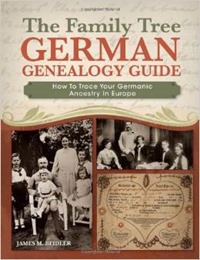 Title: The Family Tree German Genealogy Guide
Title: The Family Tree German Genealogy Guide
Author: James M. Beidler
Format: Paperback, Kindle, Nook
Published: 2014
Synopsis: (from book cover) Follow your family tree back to its roots in Bavaria, Baden, Prussia, Hesse, Saxony, Wurttemburg and beyond. This in-depth genealogy guide will walk you step by step through the exciting journey of researching your German heritage, whether your ancestors came from lands now in modern-day Germany or other German-speaking areas of Europe, including Austria, Switzerland, and enclaves across Eastern Europe.
My Rating: ![]()
![]()
![]()
![]()
I have read (or perhaps I should say, in some cases, tried to read) other German genealogy guides. Most of the time, while informative, the writing is stilted and the content is very overwhelming, especially for those new to the idea of researching German ancestors. The Family Tree German Genealogy Guide is written more casually and conversationally and allows the reader to absorb the content a little easier; I appreciate that.
While the book is generally considered a reference book, this is one that should be read from start to finish. Part 1 (chapters 1 to 4) covers the history of German immigration to the United States, discusses strategies for determining the townland of the immigrant, and has a pretty extensive history of Germanic lands over the centuries. Reading about the history made me realize just how crazy the area was over the centuries and how certain events may have impacted my ancestors. I really appreciated the first part of chapter 1 where the author supplies some fun and interesting tidbits about German culture; it made me feel a bit more connected to my otherwise severed German roots.
Chapter 5 explains the current and historical geographical divisions. There is discussion on using gazetteers and atlases to locate the village that the immigrant ancestor came from (and its equivalent today). Knowing all of this is vital to figuring out what records may exist and where to find them. Although helpful, I’m not sure the discussion of travel tips was appropriate for this chapter. It seems a little intimidating at this point in the book; perhaps a relevant chapter later on or an appendix would have been a better option.
In chapter 6, readers get a taste of the German language, particularly handwriting, grammar, and phonetics. I found the primer on grammar and phonetics very helpful (got the old script down pretty well already). Surnames and given names are also discussed in this chapter.
Part 3, chapters 7 to 12, is all about records. For each of the main record types discussed, which includes civil registration, church, census, court, and military records, the author explains the background, what can be found in the records, and where to find the records. The one thing I felt was missing, was how to find these records when the place you are researching is no longer part of Germany (e.g., my Prussian ancestors’ villages are now in Poland, so where do those records exist today, or do they even exist, and how might I go about retrieving them?). Other than that, the details provided for each type gave me a better idea of what to expect, especially for those that I was unaware of previously.
The last part wraps up with a few case studies to illustrate different records and approaches. Additionally, a few brick wall strategies were discussed.
There are seven different appendices including sample letters (with instructions) to request records, a list of archives and libraries in the United States, and of course, a table illustrating old German script variations (although in my copy, the table is formatted wrong on page 178).
Other than the table formatting error (just mentioned) and the few other editing errors, this book was much more digestible than the others I have read (or attempted to read). I really got a lot from the history portion and learned about a few new-to-me record sets. All in all, a good read that will serve as a quick reference in the future.
Disclaimer: I did receive a review copy from the publisher.
Purchase The Family Tree German Genealogy Guide on Amazon: Paperback or Kindle.
Read my other reviews of both non-fiction and fiction genealogy-related books.

Thank you. I got notice of this book just the other day and so I was happy to read your review. Very good!
I don’t know if you are already aware of the Parish Registers at the Evangelical Central Archives of the Protestant Church in Germany? The archive, called EZA = Evangelisches Zentralarchiv or ezab, is located in Berlin, and holds also Protestant church books of the former Prussian church provinces (Westpreußen, Ostpreußen, Pommern, Posen, Schlesien, Brandenburg Ost), areas which today belong to Poland, Russia and Lithuania. The site also shows references and links, f.e. to Catholic archives. Here is the link in English:
http://www.ezab.de/english/parish_registers.html
The EZA (ezab) is going to gradually put their data online in the new and upcoming German church book portal = Kirchenbuchportal, which will have the name ‘Archion’. This is a website long awaited for. Digitized church books are going to be searchable online. It is still under construction, however it will be for the first time accessable by external users in a Betatest starting September,13, 2014. A registration for the newsletter and choosing the option for participating in the Betatest was necessary for that. It seems as if there is already a long list of applicants for the Betaphase. The next phase will begin approx. October. Here is the link to their blog which is (unfortunately only) in German:
http://www.kirchenbuchportal.de/wer-sitzt-drin-im-boot/
http://www.kirchenbuchportal.de/ablauf-der-betaphase/
Thought these infos might be interesting to you 🙂
Thanks, Susanna. I didn’t know about that. Fortunately, the church records I need for my family in Posen are on film at the FHL. The other family, in Pommern, are not, so I will have to look into this. Thanks for the tip!
For the research in the area of POMMERN / POMERANIA here are some links, almost all of them in English. I know, they are quite a few and you probably already know some of them. Nonetheless, I thought of posting them here to share them. Maybe they can be of help.
http://baza.archiwa.gov.pl/sezam/pradziad.php?l=en
http://en.pommerndatenbank.de/index.html?sessid=79827a9b5b8784097633a4990a574aa2
http://en.kb.pommern.org/
http://www.ptg.gda.pl/index.php/publisher/articleview/frmArticleID/2/
http://www.byarnd.de/home.html
http://www.cantows.de/ahnen/ahngebh1.htm
http://www.online-ofb.de/buetow/index.php?lang=en
http://buetow-pommern.info/materialien/doerfer/doerfer.htm
http://www.rootsweb.ancestry.com/~mnprgm/Schlochau/index.html
http://ourwebpages.net/pommern_ws/map_table.html
http://www.immigrantgensoc.org/
http://pomeranianews.com/
http://www.pommerschen.blogspot.com.es/
http://www.mennonitegenealogy.com/faq/index.html
http://www.mennonitegenealogy.com/faq/poland.htm
http://polishmuseumwinona.org/history/the-kashubians/
Thanks, Susanna!